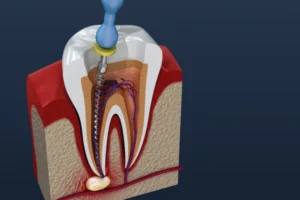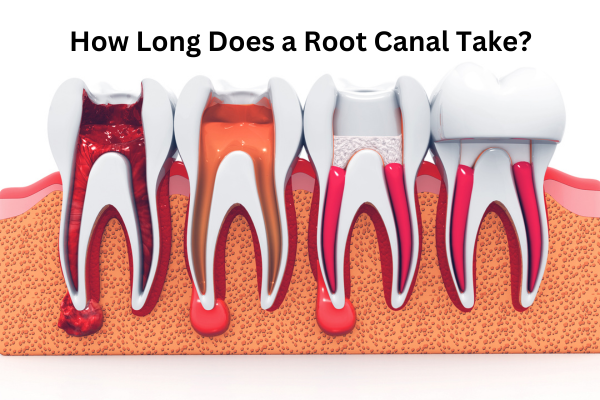Have you ever experienced that pounding pain in your tooth? Your dentist might have mentioned a root canal treatment, and you’re probably wondering what that means. You may feel uneasy and have multiple questions, such as, “How long does a root canal take? What happens during the procedure? Is a crown necessary? How many years can the tooth survive after a root canal?”
It’s okay to feel uneasy – root canals might sound scary, especially if you think about removing the problem tooth. But guess what? We’re here to ease your worries and take you on a journey through the process. Imagine Valley Ridge Dental as your guide, equipped with high-tech dental tools and super cool technology. Our experts are like dental superheroes, ensuring every step of the treatment is precise and comfy.
What Happens During a Root Canal Treatment?

The root canal procedure involves a series of below-mentioned straightforward steps.
- Using a local anesthetic, the dentist will numb the area where your tooth or teeth need treatment.
- They’ll use sterilized tools to create a small hole in your tooth. Then, the damaged tissue or infection inside your tooth will be gently removed.
- Your tooth’s interior will be rinsed multiple times. If there’s an infection, the dentist might place medication inside the tooth to eliminate the remaining bacteria.
- X-rays will be taken to ensure the root is completely clean.
- If you’re returning for a follow-up visit to finish the treatment or to have a dental crown fitted, the hole in your tooth will be temporarily filled. A more permanent restoration might be placed if the treatment is completed in one visit.
- A crown could be placed during a later visit to protect and seal your tooth permanently. Crowns are especially important for back teeth used in chewing, as removing the pulp can weaken the tooth.
Is Root Canal Painful?
Because root canals are performed using local anesthesia, they are generally not more painful than standard procedures. You might feel slight soreness, numbness, or mild discomfort for approximately 24 to 48 hours after the treatment.
This discomfort can often be eased with over-the-counter pain relievers. Most individuals can resume their regular activities on the same day. Interestingly, the pain from the infected tooth is frequently more intense than any discomfort experienced after the root canal procedure.
How Long Does a Root Canal Take?

A regular root canal treatment usually lasts around 30 to 60 minutes. This time is for the actual procedure, not counting any time spent waiting or inside the procedure room. After the dentist applies local anesthesia, there’s a waiting time for it to work before the procedure starts.
If the treatment is complicated or needs to be redone, it might take 60 to 90 minutes or up to 2 hours. Teeth that have been treated before or have complex root canal structures might need a more thorough cleaning, which takes extra time.
How Long Does a Root Canal Take According to Types of Teeth?

Front Teeth
Canines and Incisors
These teeth at the front of your mouth assist in tearing and cutting food as you eat. Their single root structure makes filling and treatment quicker and simpler.
Middle Teeth
Premolars
They’re situated more toward the middle of your mouth; premolars have one or two roots, which means cleaning them out might take around an hour or more.
Back Teeth
Molars
Molars are found at the back of your mouth, are larger, and can have up to four canals. Root canals performed on molars can take 90 minutes or even longer.
Will I Require a Crown After Having Root Canal Treatment?
Usually, after a root canal, a dental crown is placed on the tooth to keep it safe from breaking. Root canals are usually needed when the tooth’s outer layer, called enamel, is badly decayed, letting harmful bacteria get inside and cause an infection. A crown lowers the risk of another infection.
How Much Does a Root Canal Treatment Cost?

The root canal treatment cost differs based on factors such as the number of teeth requiring treatment, your preference for anesthesia or sedation, and the overall intricacy of the procedure. Our team will discuss these aspects with you during your consultation and offer an estimated cost for your dental care. We also provide financial assistance for our patients.
How Long Will the Tooth Last After the Root Canal Treatment?
After a successful treatment, the treated tooth can endure for the rest of your life. The filling within the tooth is resilient against infection, and the supporting structure holds the tooth firmly. Your oral care routine is the key factor influencing the tooth’s longevity post-root canal.
You can keep your restored tooth healthy throughout your lifetime, by brushing twice daily and flossing once a day. Also visit your dentist every six months for regular dental cleanings and exams to maintaine your tooth’s well-being.
Conclusion
At Valley Ridge Dental, we offer outstanding dental and oral surgery services for patients of all ages. Our dedicated team, consisting of general and cosmetic dentists, pediatric dentists, and oral surgeons, goes the extra mile to provide exceptional care to each patient.
The office of Valley Ridge Dental is equipped with state-of-the-art technology and offers various payment options and financing to make oral health treatment more accessible We prioritize preserving your natural teeth and ensuring a comfortable experience. If you’re dealing with infected dental pulp, or tooth pain, or want to know more about what root canal treatment is, feel free to contact us.
FAQs
-
Can I eat after a root canal?
After a root canal, you can start eating again in about 30 to 45 minutes. This lets the temporary filling get harder. But it’s better to wait until the numbness from the anesthesia is gone so you don’t accidentally bite your cheek or tongue.
-
Can I brush my teeth after a root canal?
Once you’ve had a root canal, brush your teeth gently to avoid irritation or harm. Brush two times a day with a soft-bristle toothbrush and fluoride toothpaste. Use gentle movements while brushing, and make sure not to forget the back teeth and tricky spots that are hard to reach.
-
Is root canal safe for a lifetime?
Even though the tooth doesn’t have living pulp anymore, the ligament around it holds it steady, so it can still work properly even after the pulp is gone. While root canals can stay good for a lifetime, there might be situations where your tooth needs another treatment.





